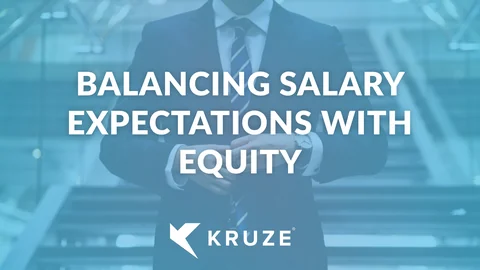
Starting a business is a complicated process. For startup founders, one of the most challenging decisions revolves around how to compensate themselves – balancing salary expectations with equity ownership. This decision impacts not only their personal finances but also the long-term health and growth of their startup. And it becomes even more important once you start seeking funding from venture capital firms.
That’s one of the reasons that Kruze Consulting publishes our annual CEO Salary Report – to show founders how others are being compensated so they know what salary expectations are reasonable. But startup CEO compensation is more than cash compensation – the primary wealth-building mechanism for founders looking to build generational companies is equity ownership. So how do founders balance the two? Here’s a guide to navigating this critical aspect of startup leadership.
The Role of Salary in Early-Stage Startups
In the early days of a startup, cash is typically scarce, and founders often prioritize reinvesting resources into the business. It’s common for founders to either forego salaries or pay themselves modestly during the pre-seed and seed stages. This frugality allows startups to allocate funds toward product development, marketing, and hiring key talent. However, underpaying yourself indefinitely can lead to burnout and financial strain. Once external funding is secured – such as after a Series A round – founders typically increase their salaries to levels that are more representative of the overall marketplace.
Equity as a Long-Term Wealth Creation Tool
Equity ownership aligns the founder’s financial interests with the success of the company and incentivizes long-term growth over short-term financial stability. A startup founder typically begins with 100% ownership of the company. The psychological impact of holding significant equity can improve decision-making and resilience during challenges. However, as startups mature and raise additional funding rounds, founder equity tends to dilute – sometimes falling below 20% by the time a company reaches its D-round. Data from Carta shows the median amount of dilution for startups in 2023 at each funding stage:
| Investment Stage | Median Dilution |
|---|---|
| Seed | 20.5% |
| Series A | 19.5% |
| Series B | 17.2% |
| Series C | 12.6% |
| Series D | 10.3% |
A founder who went through all the funding rounds above at those dilution percentages would hold a 19.9% equity stake in the company after Series D, subject to vesting schedules that protect both the company and individual stakeholders. This underscores the importance of carefully structuring equity agreements when you’re starting your company.
One important point that founders need to remember is that all equity grants need to be carefully tracked using a capitalization table. The best way to do this is with cap table software, and you’ll need the help of an experienced startup attorney. Once your cap table is in place, you need to make sure that it’s reconciled regularly, which involves reviewing every stock purchase agreement and matching it to the cap table. Kruze Consulting helps clients with cap table reconciliation.
Striking the Right Balance Between Salary and Equity
To balance salary expectations with equity ownership, founders need to consider several factors:
- Stage of growth. Early-stage startups typically favor equity-heavy compensation models due to cash constraints. As companies secure funding and generate revenue, salaries can gradually increase while new equity grants decrease.
- Personal financial needs. Founders should make sure they cover basic living expenses without compromising their focus on building the business. Deferred compensation – documenting unpaid wages for future collection – can be an option during lean periods, but founders should bevery careful with deferred compensation since it can create issues when fundraising and can also lead to payroll tax compliance issues.
- Investor signals. Modest salaries paired with significant equity stakes demonstrate to investors that founders have “skin in the game.” This approach builds trust and aligns interests between leadership and stakeholders.
- Team dynamics. As startups scale, founders often face the challenge of paying new hires higher salaries than their own. While this may feel counterintuitive, it’s essential for attracting top talent who can drive growth.
- Industry benchmarks. Compensation structures vary by industry and role. For example, technical positions may demand higher cash and equity due to market demand.
Practical Tips for Founders
- Start small but fair. In the early stages, prioritize equity over cash while making sure you can meet personal obligations.
- Use vesting schedules. Protect your stake with vesting agreements (e.g., four years with a one-year cliff) to safeguard against premature dilution.
- Plan for future needs. Reserve sufficient equity for key hires and adjust your compensation strategy as your company grows.
- Reassess regularly. Conduct annual or biannual reviews of your compensation package based on funding status and market benchmarks.
- Communicate transparently. Be upfront with co-founders, employees, and investors about your compensation philosophy to avoid misunderstandings down the line.
- Seek expert advice. You should consult legal and financial advisors when creating salary and equity packages to make sure your compensation is compliant with applicable regulations and fair to both you and your startup’s employees.
By carefully structuring compensation packages that evolve alongside your startup, you can protect your personal financial stability while positioning your startup for long-term success.








